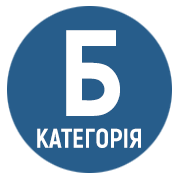NEW APPROACHES TO THE QUESTION OF TYPOLOGIES OF THE TACIT KNOWLEDGE
DOI:
https://doi.org/10.24919/2522-4700.43.16Keywords:
implicit knowledge, typology of implicit knowledge, autopoetics knowledge, cognitive system, natural languageAbstract
The article examines a special fragment of the human cognitive system – implicit knowledge. Modern philosophy does not pay enough attention to this impotent component of human cognition, especially the question of the typology of implicit knowledge. The purpose of the study: analysis of the development of implicit type of knowledge and formulation on this basis of approaches to the classification of implicit knowledge. Methodology. The work used general scientific and formal-logical methods of analysis, synthesis, comparison, abstraction. In addition, historical and genetic method were used, as well as linguistic, hermeneutic and heuristic research methods. Scientific novelty. A fundamentally new approach to the analysis of this type of human knowledge is introduced, as well as to the solution of the problem of developing a holistic typology of implicit knowledge relevant to modern theory of cognition. It is proposed to take as a basis for such a typology the historical-genetic approach, which consist in considering the main stage of formation of implicit knowledge in the history of homo sapiens, analysis of different types of implicit knowledge that arise at these stages, and implementation of the first steps to create a systematic typology of implicit knowledge. In the course of the analysis the special role played by the primitive types of implicit knowledge formed at ancient people at the biological level in the course of direct practical activity of people is provided. Autopoetic origins of primitive knowledge originate from the animal ancestors of human, but at a new level acquire new qualities. An important conclusion obtained in the article is the assumption, more precisely, the statement that this oldest layer of implicit knowledge retains its significance for modern human. Not only does this knowledge take part in many human cognitive actions, it is an integral part of the fundamental, basic layer of ascending prerequisite knowledge on which almost all human cognitive activity, including scientific, is based. A special kind of implicit knowledge is also analyzed – implicit knowledge, which is inherent in natural language. They also formed in ancient times, but not only exist but also actively operate within the modern natural languages of mankind. Implicit components of language play an important role both in the processes of direct communication and in theoretical and scientific cognition. Conclusions. Although the implicit, unconscious nature of this phenomenon makes it difficult to formalize, abstract-scientific and philosophical analysis, research in this area is necessary and impotent for a deeper and more accurate understanding of the specifics of human knowledge in general and abstract-logical, conceptual, scientific knowledge.
References
Polanyi, M. Personal Knowledge: Towards a Post-Critical Philosophy. University of Chicago Press. 1958.
Губанова Е.О. Неявное знание: сущность и виды. URL: http://www.zpu-journal.ru/zpu/contents/2010/4/
Цветков В.Я. Паралингвистические информационные единицы в образовании. URL: https://pnojournal.wordpress.com/2015/06/15/.
Микешина, Л.А. Эпистемология ценностей. М.: (РОССПЭН), 2007. 439 с.
Wilhelm von Humboldt. Essays on Language. T. Harden and D. Farelly (eds.), Frankfurt, Berlin, Bern, New York: P. Lang. 1997.
Foucault, Michel. The Subject and Power. University of Chicago Press, 1982.
Голубовська, І.О. Етнічні особливості мовних картин світу: монографія. Київ: Логос, 2004. 283 с.
Маслова, В.А. Современная лингвистика и исследования ментальности в ХХI веке: монография. Киев: Логос, 2014. С. 44‒52.
Meillet, A. The comparative method in historical linguistic. Translated by Gordon B. Ford. Presses Universitaires de France, Jr., 1966.


